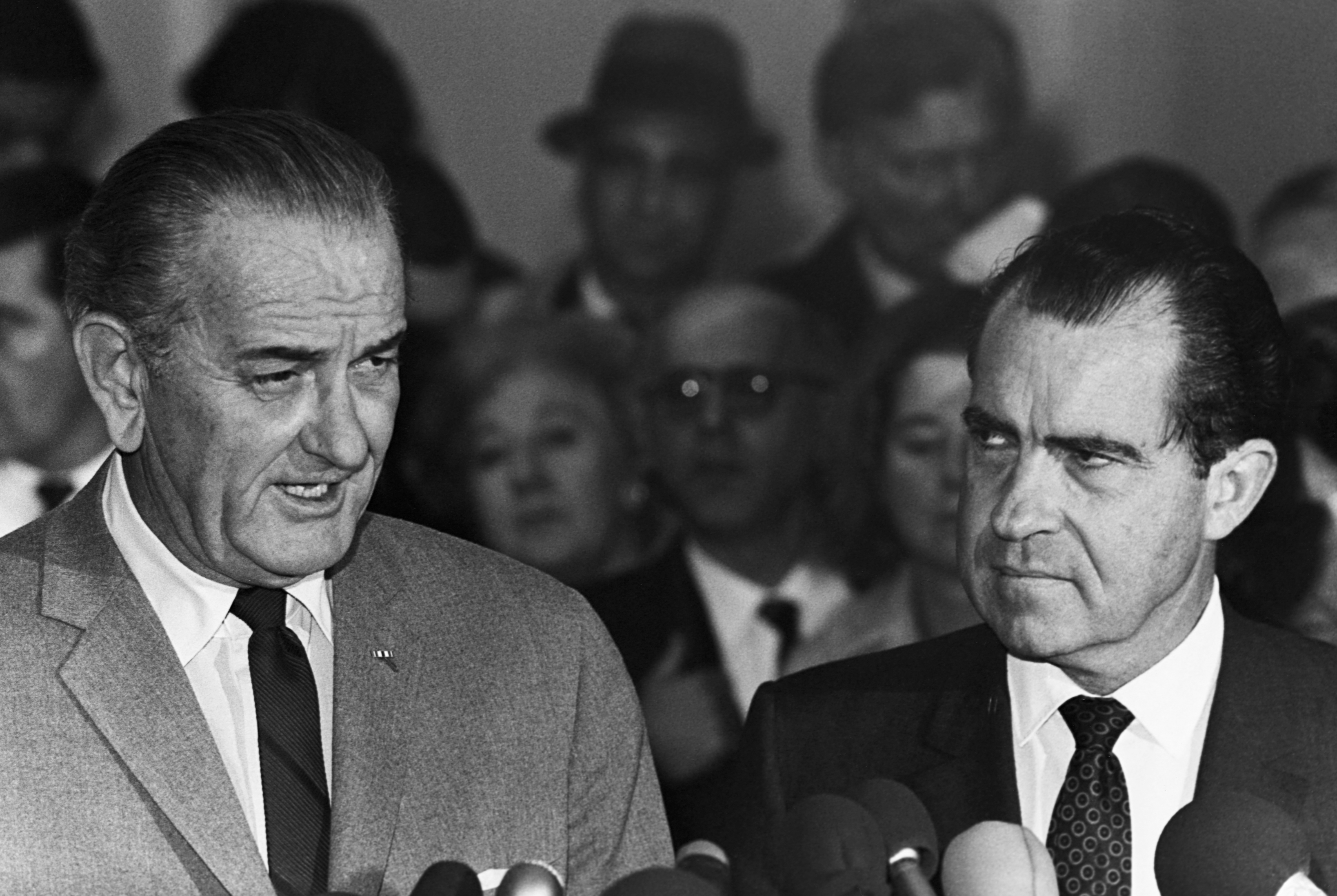The US presidents who decided not to run for a second term
Joe Biden's decision to end his re-election campaign was shocking, but there's a long history of presidents who've bowed out on a chance at four more years


A free daily email with the biggest news stories of the day – and the best features from TheWeek.com
You are now subscribed
Your newsletter sign-up was successful
The lead-up to this year's presidential election may have seemed at first glance to be nothing more than a rehash of the previous one, but the 2024 campaign for the White House has proven itself to be anything but. Instead, if the past few weeks have shown us anything, it's that nothing is guaranteed in politics — even in the most static-seeming circumstances. No matter how much President Joe Biden's decision to end his reelection campaign may have seemed inevitable in hindsight, his announcement landed with seismic impact on Sunday, upending a race that felt to many like a stale continuation of 2020.
Biden's withdrawal, and his subsequent endorsement of Vice President Kamala Harris to take his place atop the Democratic ticket may have thrown this particular election into deep, and uncharted waters, but it is not wholly without historical precedent. By opting not to run for a second term, Biden now joins a small but illustrious group of past presidents who, for varying reasons, also chose to eschew a return to the White House after their single terms in office.
James Polk
Considered by historians to have been the first "dark horse" president, James Polk was a relative unknown prior to his run for high office ("Who is James K. Polk?" was a common refrain from his Whig opponents) but left office as one of the most consequential commanders in chief in American history. Elected in 1844, Polk entered the presidency with a "specific set of goals," including the massive territorial expansion through the annexation of the Republic of Texas and huge swaths of the southwest, Voice Of America said. In an era when it was "common for candidates to pledge not to run for reelection as a mark of personal humility," Polk "honored his pledge" and did not mount a campaign in 1848.
The Week
Escape your echo chamber. Get the facts behind the news, plus analysis from multiple perspectives.

Sign up for The Week's Free Newsletters
From our morning news briefing to a weekly Good News Newsletter, get the best of The Week delivered directly to your inbox.
From our morning news briefing to a weekly Good News Newsletter, get the best of The Week delivered directly to your inbox.
James Buchanan
James Buchanan's pledge to serve a single term in 1857 was "likely a good thing, in retrospect, since experts rank him as the worst president of all time," Stacker said. Buchanan was "eager to vacate the White House before civil war became a reality," and his "antagonistic relationship with Stephen Douglas split the Democratic Party," clearing a path for Republican Abraham Lincoln to win the election in 1860, American Experience said.
Rutherford Hayes
Rutherford Hayes initially entered office in 1877 after one of the "most hostile, controversial campaigns in American history," said his presidential library. That controversy, in which several states alleged instances of electoral fraud, meant "legitimacy was never fully accepted by many Democrats," VOA said, likely making it easier for him to follow through on his pledge to serve only one term.
Calvin Coolidge
After assuming the presidency in the wake of Warren Harding's sudden death in 1923, Calvin Coolidge won the position outright the following year. During his 1925 inaugural address he declared that the country was enjoying a "state of contentment seldom before seen." Coolidge's primary presidential attribute was "his talent for effectively doing nothing," the White House said. Broadly popular, Coolidge's now-infamous announcement that "I do not choose to run for president in 1928," was "variously interpreted throughout the country" with some seeing it as a "sincere wish for retirement, but still a willingness to accept the nomination should an insistent demand arise," while others saw a "final decision that he would not be a candidate for re-election," The New York Times said. He later explained his decision, saying the "presidential office is of such a nature that it is difficult to conceive how one man can successfully serve the country for a term of more than eight years."
Harry Truman
Like Coolidge, Harry Truman first assumed the presidency in 1945 upon the in-office death of his predecessor — Franklin D. Roosevelt — before winning the position outright in the following election. Unlike his predecessors, though, Truman initially did launch a reelection campaign, entering the 1952 New Hampshire primary in March of that year. He was ultimately "beaten by Tennessee Sen. Estes Kefauver, 19,800 votes to 15,927," The Kansas City Star said. Two weeks later he "affirmed his dedication to the Democratic Party and ended with the announcement that he 'shall not be a candidate for reelection.'" Notably, just one month earlier, "Truman's popularity rating fell to an all-time low of 22 percent," Politico said.
A free daily email with the biggest news stories of the day – and the best features from TheWeek.com
Lyndon Johnson
Until Biden's announcement, the most recent president to opt out of a reelection campaign was Lyndon Johnson who shocked the country at the end of an Oval Office address on the war in Vietnam by declaring he would "not seek" and "not accept" his party's nomination at the 1968 Democratic National Convention in Chicago. That year Johnson was "facing multiple challenges for the Democratic nomination" and had "only narrowly won the New Hampshire primary against the anti-war candidate Sen. Eugene McCarthy," CNN said. In addition to longstanding health concerns, Johnson "understood he was not likely to win," and had become "very controversial and really lost his hold on public opinion because of the Vietnam War," said historian Robert Dallek to The Washington Post.
Rafi Schwartz has worked as a politics writer at The Week since 2022, where he covers elections, Congress and the White House. He was previously a contributing writer with Mic focusing largely on politics, a senior writer with Splinter News, a staff writer for Fusion's news lab, and the managing editor of Heeb Magazine, a Jewish life and culture publication. Rafi's work has appeared in Rolling Stone, GOOD and The Forward, among others.
-
 What to watch out for at the Winter Olympics
What to watch out for at the Winter OlympicsThe Explainer Family dynasties, Ice agents and unlikely heroes are expected at the tournament
-
 Properties of the week: houses near spectacular coastal walks
Properties of the week: houses near spectacular coastal walksThe Week Recommends Featuring homes in Cornwall, Devon and Northumberland
-
 Will Beatrice and Eugenie be dragged into the Epstein scandal?
Will Beatrice and Eugenie be dragged into the Epstein scandal?Talking Point The latest slew of embarrassing emails from Fergie to the notorious sex offender have put her daughters in a deeply uncomfortable position
-
 Supreme Court upholds California gerrymander
Supreme Court upholds California gerrymanderSpeed Read The emergency docket order had no dissents from the court
-
 Trump demands $1B from Harvard, deepening feud
Trump demands $1B from Harvard, deepening feudSpeed Read Trump has continually gone after the university during his second term
-
 House ends brief shutdown, tees up ICE showdown
House ends brief shutdown, tees up ICE showdownSpeed Read Numerous Democrats joined most Republicans in voting yes
-
 Trump’s Kennedy Center closure plan draws ire
Trump’s Kennedy Center closure plan draws ireSpeed Read Trump said he will close the center for two years for ‘renovations’
-
 Trump's ‘weaponization czar’ demoted at DOJ
Trump's ‘weaponization czar’ demoted at DOJSpeed Read Ed Martin lost his title as assistant attorney general
-
 Democrats win House race, flip Texas Senate seat
Democrats win House race, flip Texas Senate seatSpeed Read Christian Menefee won the special election for an open House seat in the Houston area
-
 New Epstein files dump strains denials of elites
New Epstein files dump strains denials of elitesSpeed Read Fallout from the files has mostly occurred outside the US
-
 The ‘mad king’: has Trump finally lost it?
The ‘mad king’: has Trump finally lost it?Talking Point Rambling speeches, wind turbine obsession, and an ‘unhinged’ letter to Norway’s prime minister have caused concern whether the rest of his term is ‘sustainable’
